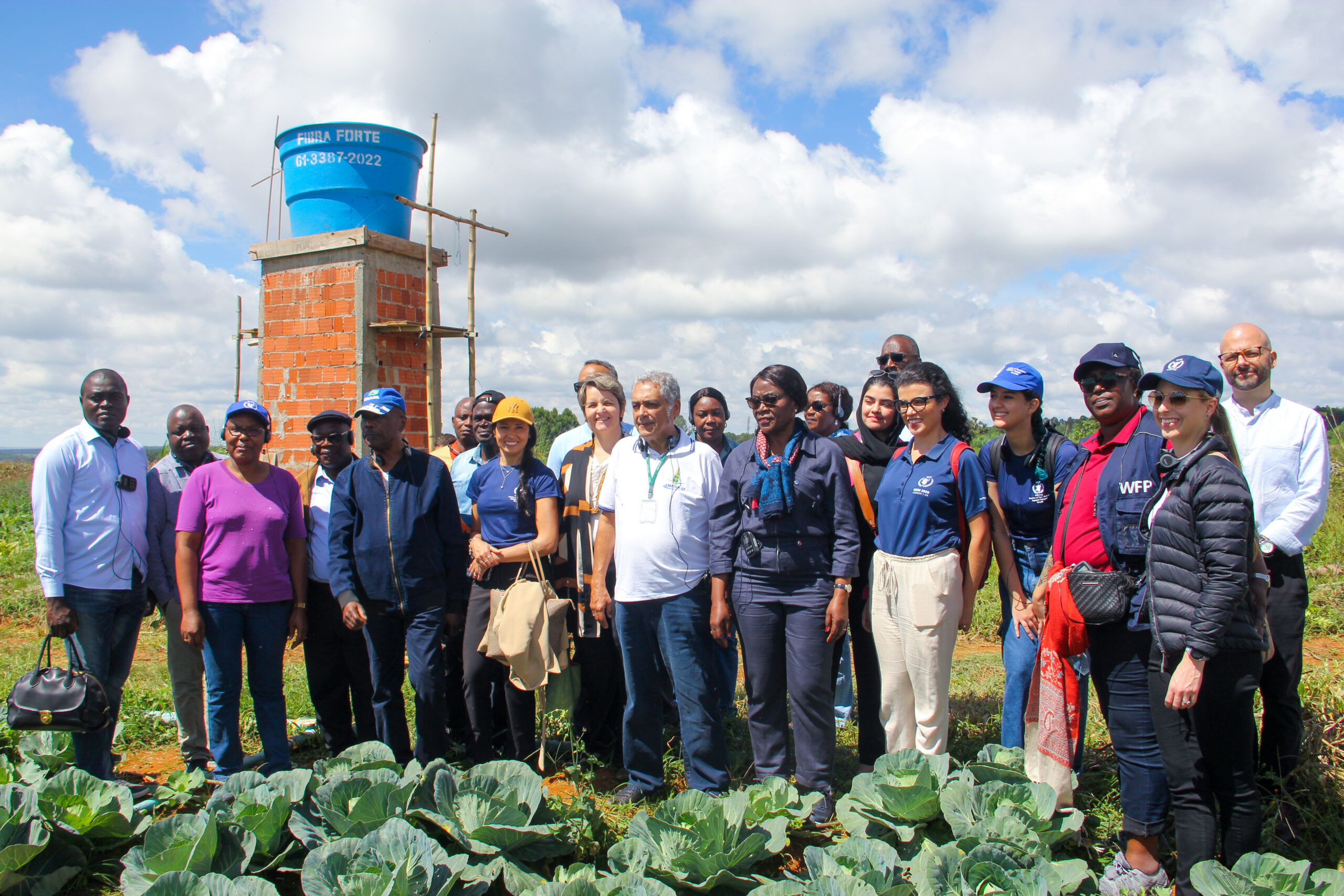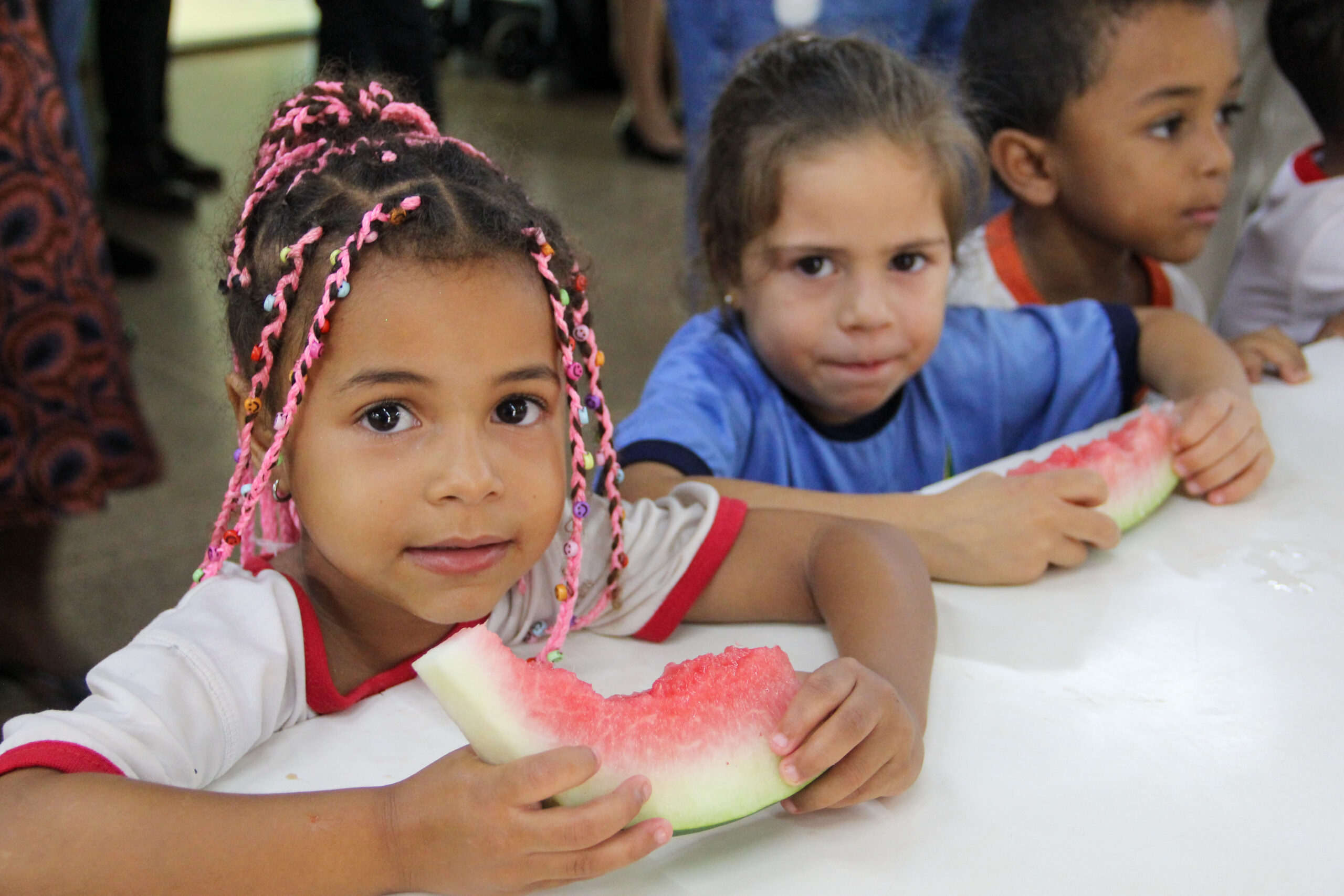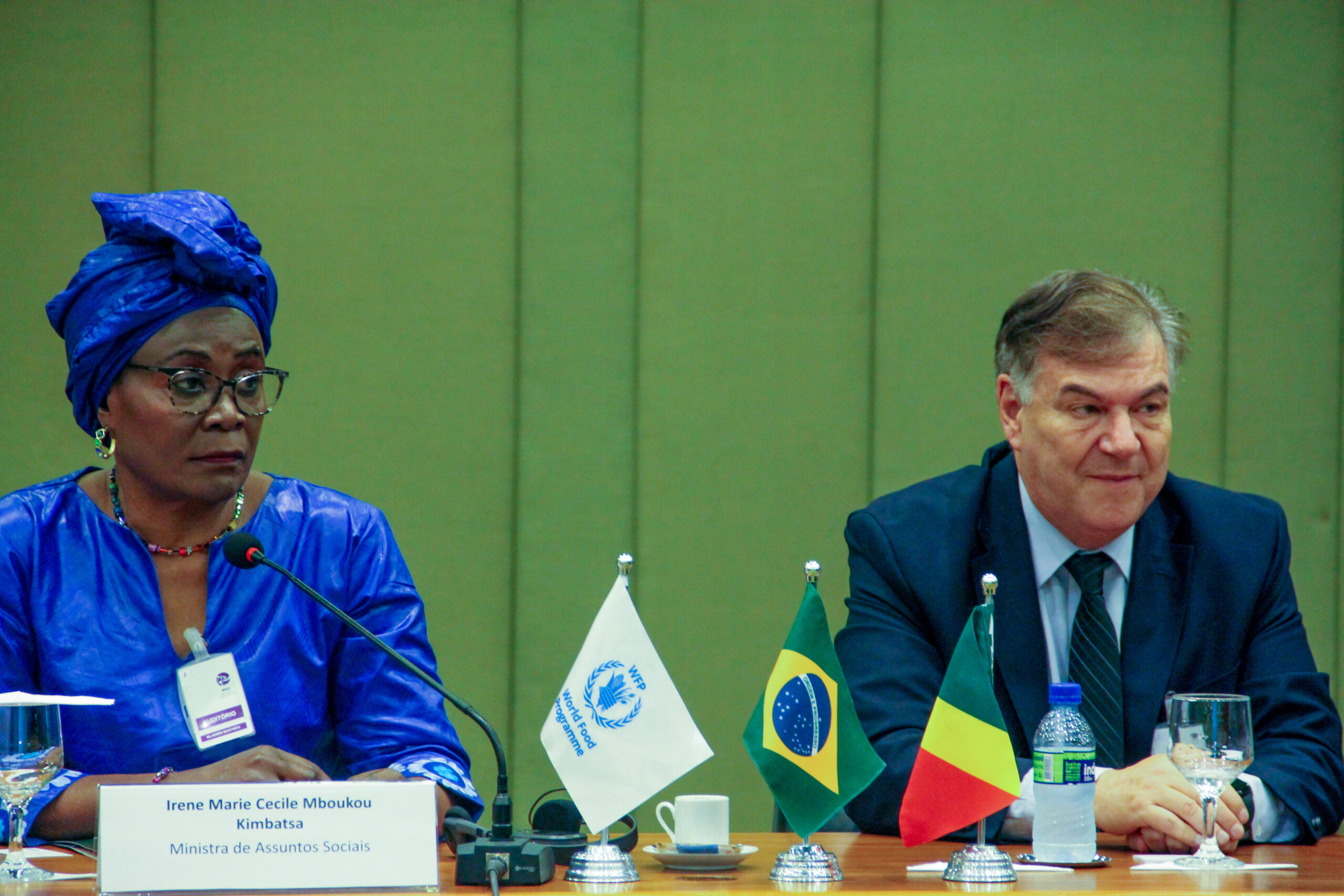
On Friday, 14 April, a delegation composed of government officials from the Republic of Congo, the World Food Programme (WFP) country office and regional bureau concluded a week-long study visit to the Brazilian school feeding programme in the Federal District. The delegation, led by the Congolese minister of Social Affairs and included high level officials from the ministries of Education, Agriculture and Planning, visited rural and urban schools, a local smallholder farmers’ cooperative and engaged in technical discussions with Brazilian officials.
The visit is an important tool to help countries exchange relevant information regarding social policies that are key to save and change lives, which is the case of school feeding programmes. In Brazil, the programme reaches over 40 million students and has inspired dozens of other countries over the years. “This is precisely one of the objectives of meetings like this – for us to use our expertise to help improve school feeding in other countries”, said Fernanda Pacobahyba, president of the Brazilian fund for Education Development, which runs the National School Feeding Programme.
In addition to promoting food and nutrition education, the Brazilian programme also strengthens smallholder farming through a legal instrument that requires at least 30% of food procurement to be done locally. “The Brazilian school feeding programme connects smallholder farmers to local markets, making sure they secure a stable income and more social mobility, contributing to the socioeconomic development of whole communities, while also reducing the need for sourcing products elsewhere”, said Daniel Balaban, Director of the WFP Centre of Excellence against Hunger in Brazil.
The Congolese school feeding programme currently covers seven of the 12 departments in the country, which represents 27,3% of public schools. The national school feeding policy was approved in 2019 and has a vision to supply sustainable, locally-sourced school meals to all children by 2025. “As we have seen in Brazil, and in collaboration with the Ministry of Agriculture, the Ministry of Education and the Ministry of Planning, we will work with family farmers to integrate their production into the school feeding system”, said Irène Marie Cécile Mboukou Kimbatsa, Congo’s Social Affairs Minister.
Some of the challenges faced by Congo is local food procurement, programme financing and logistics. “What is very useful in the Brazilian experience is particularly the interrelationships between the different intergovernmental departments and I think that is why the programme is also recognized for its excellence worldwide”, said Sidi Mohamed Babah WFP Deputy Country Director. “One thing that caught my mind is that no matter the economic crisis, no matter what the country might be going through, their federal commitment to the school feeding programme always remains intact”, he added.
The study visit is the result of a partnership between the WFP Centre of Excellence and the Brazilian government, through the National Fund for Education Development and the Brazilian Cooperation Agency.

Lunch time at the school Centro Educacional Pipiripau 2, located in the rural area of Planaltina. Credits: WFP/ Caroline Melo
A closer look at the Brazilian experience
The programme included field trips to a smallholder farmers’ cooperative and rural and urban schools. Congolese officials were able to get a closer look at details such as how the requirement to buy from local family farmers is put into practice, the connection between school feeding programmes and other rural development programmes, how schools plan their weekly menus and how students are engaged in health and nutrition education.
At the Centro de Ensino Fundamental Polivalente school, the delegation was able to see how the school kitchen is run, how they manage purchases and school menus, and had a taste of a typical meal composed of chicken, rice, pumpkin and potatoes, with melon for dessert.
The school serves daily hot meals to 1,075 students, many of them coming from neighbouring cities. All vegetables are supplied by local smallholder farmers each week, while non-perishable goods are delivered every seven weeks. The school also runs several health and nutrition projects, led by the Physical Education and Science teachers, in which students learn about health, nutrition and the importance of keeping active.
Alda Aparecida Ramos, Director of School Feeding at the Federal District government, explained that the inclusion of family farming products in the school menus brings benefits to students, who consume fresh and seasonal food, and to the local economy. In the Federal District, 40% of products used in school menus are purchased from local smallholder farmers. “With the family farming programme, they have a guaranteed customer for the sale of these products, which is the District’s Education Department, which runs the school feeding programme,” she said. “Thus, the students benefit from the quality of the food, and the farmers benefit as well by having an income from the sale of these products.”
Later on, the delegation visited a rural school, Centro Educacional Pipiripau II, which serves two meals each day to 519 students. This is particularly important at this school because many students travel up to two hours by bus to get there. The menu includes seasonal fruits and regional recipes, and all fruit, vegetables and dairy products are supplied by local smallholder farmers’ cooperatives. The school has a herbs garden and also runs health and nutrition projects, with the focus on managing waste.
Margaret Malu, WFP Deputy Regional Director for the Southern Africa region, said that the human capital development aspect is very present at the Brazilian school feeding programme. “These are the leaders of the future. So for development this is very significant because a child that is healthy, a child that is educated is going to be a very strong leader for the country in the future”, she said.

Minister of Social Affairs, Irene Marie Cecile Mboukou Kimbtasa, left, and the Director of the Center of Excellence, Daniel Balaban, right. Credits: WFP/ Ana Mascarenhas
Fighting hunger through South-South Cooperation
The WFP Centre of Excellence, in partnership with the National Fund for Education Development and the Brazilian Cooperation Agency, has been facilitating these technical exchanges between countries to help build and strengthen social protection programmes such as school feeding ones for nearly 12 years. The study visit is part of a broader package of technical assistance provided to countries, through South-South Cooperation mechanisms, to promote knowledge exchange.
“I think that all countries in the world face similar challenges to organize a national school feeding programme, so it is important to show how Brazil is facing these challenges, how Brazil is organizing a school feeding programme that feeds around 40 million children in the country and how they purchase directly from smallholder farmers”, said Daniel Balaban, Director of the WFP Centre of Excellence in Brazil. “In the case of Congo, even in the nature itself, the type of commodities that are being distributed even in the schools and so on, but also the development of the programme here is something that could be replicated more easily in other southern countries”, said Sidi Mohamed Babah WFP Deputy Country Director.
“The World Food Programme regional ambition in Southern Africa for school-based programmes is that quality national school feeding programmes links local production, exists at scale and acts as a platform to enhance development thought human capital investment in the region”, said Margaret Malu, WFP Deputy Regional Director.




